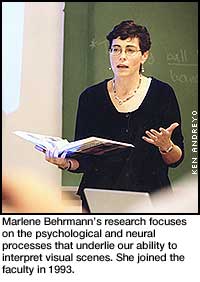|
|
||
|
|
|
 Behrmann Cited for Her Research into the Mind's "Eye"
Behrmann Cited for Her Research into the Mind's "Eye"
When visual scenes contain multiple objects and people, we take it for granted that we can recognize them all with ease and accuracy. But just how the brain gathers and interprets raw visual material remains something of a mystery.
Associate Psychology Professor Marlene Behrmann is uncovering some clues about how our brain "sees." In the process, she is creating a better sense of our mind's "eye" and changing the landscape for possible treatment of brain disorders.
For this groundbreaking work, Behrmann has received the Early Career Award in behavioral and cognitive neuroscience from the American Psychological Association.
One of the things that most excited Behrmann about the award was the recognition of a growing body of research on how the brain interprets visual signalsčlight waves of differing frequency and intensity that strike the retinačand then how the brain makes sense of this scrambled input.
"I worked for several years as a speech pathologist," she said. "Many of my patients were adults with language problems caused by brain lesions. While I was very interested in their behavior, I was even more interested in what was going wrong in the brain. So after much thought, I decided to change my course from therapy to cognitive neuroscience."
Research in Behrmann's lab focuses on the psychological and neural processes that underlie our ability to interpret visual scenes. These processes allow us to recognize objects, faces and words, and they enable us to know where these items appear so that we can reach out to pick them up, or move our eyes to inspect them further.
Through detailed examination of the behavior of these individuals, as well as using functional magnetic resonance imaging with non-impaired subjects, Behrmann attempts to address three major questions: How are form and identity of objects represented in our brain? How is location, or spatial information, "coded" by the brain? How are form and identity integrated with location to present the unitary visual experience that most of us enjoy?
This past summer while in Israel on sabbatical at the Weizmann Institute of Science, Behrmann and her husband, Associate Psychology Professor and Fulbright Scholar David Plaut, created a computer model of the human brain. The model can reproduce drawings like those done by patients suffering from "neglect," a fascinating disorder in which individuals, after a certain type of brain damage such as the kind caused by a stroke, ignore information appearing on one side of space.
They hope the computer model will help with understanding what has gone wrong in the patients and possibly help therapists to re-educate or prompt these patients to attend to the full spectrum of the visual information during rehabilitation.
Discoveries about the brain-eye connection are fascinating scientists and theorists worldwide. Next April, Behrmann will be a member of a panel that will talk about the mind and vision with the Dalai Lama. She's also been interviewed by the BBC and will present some new research findings at the 2002 meeting of the American Association for the Advancement of Science.
Behrmann earned her doctor's degree at the University of Toronto in 1991. She received the Presidential Career Award in Science and Engineering in 1995 at the White House and is also a recipient of the National Institute of Mental Health's FIRST Award.
Teresa Sokol Thomas
|
|
This Issue's Headlines || Carnegie Mellon News Home || Carnegie Mellon Home |
||
 Behrmann, an identical twin and a native of South Africa, says she became interested in the "science of the mind" after obtaining her bachelor's and master's degrees in speech pathology from the University of Witwatersrand in Johannesburg.
Behrmann, an identical twin and a native of South Africa, says she became interested in the "science of the mind" after obtaining her bachelor's and master's degrees in speech pathology from the University of Witwatersrand in Johannesburg.